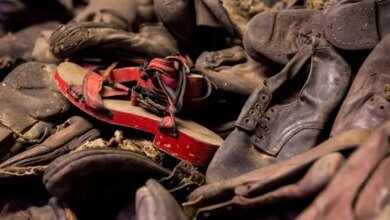What Will Survive of Us ★★★★ — Jewish Renaissance


It’s certainly true conversation is a vital part of their lovemaking, but there is plenty of graphically described action too, including some pretty hardcore S&M, as Sam discovers a penchant for bondage and submission and Lily realises that playing the dominatrix is a role that suits her. They seal their bond by buying a pretty – and effective – belt on their travels, a useful talisman for that part of their sex life as they pursue it in ever more exotic locations. Unsurprisingly they include Amsterdam’s red-light district, where Lily dresses to impress and plays her part on the streets.
Their agonising self-searching about themselves and each other is a vital part of the narrative, as is the exploration of their wider relationships. Although the heat has gone out of Sam’s relationship to his wife Selena, he finds it can still be rekindled. Sam isn’t exercised about his wife’s affairs, yet makes surmises about Lily’s. (Spotting that Sam Quaid rhymes with Sam Spade, I wondered about him playing detective like Dashiell Hammett’s detective.).
Lily’s husband Hal is patient with the ups and downs of his wife’s heady passion for Sam and there are whole chapters on the reactions of their friends. Lily consults Lucasta, whose husband has left her for an older woman. “Quite the livewire…He’ll come back… He’s done it before”, opines a world weary Lucasta.
That the novel’s title is a statement, not a question, makes it immediately, powerfully decisive, and seems to suggest that, despite everything, relationships last, and continue evolving in all their complexity until, and possibly beyond, the end of life. But it’s worth noting that Jacobson is quoting Philip Larkin’s Arundel Tomb, a poem about surveying a couple in death: “what will survive of us is love”, a sentiment Larkin concludes to be only “almost true”.
By Judi Herman




